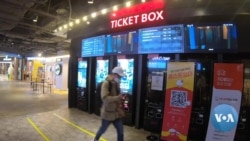The COVID-19 pandemic has taken a toll on South Korea’s film industry - one of the world’s most vibrant. And with growing concern over continuing outbreaks, it’s uncertain when audiences will feel safe enough to return to movie theaters.
Most South Korean cinemas never shut their doors during the pandemic even though box office sales have plummeted.
In May, over 1.5 million movie tickets were sold nationwide, down from nearly 17 million in January, according to the Korea Film Council. It was an improvement over April’s numbers, which dropped to a record low of 970,000 tickets.
Jason Bechervaise, who lectures on Korean cinema at Soongsil Cyber University in Seoul says the country’s film industry is “facing its biggest crisis” because of the coronavirus.
It’s a setback for an industry that gained global recognition when the dark comedy “Parasite” prevailed at the Academy Awards ceremony in February, becoming the first non-English language movie to take home the Oscar for Best Picture.
But, compared to film industries in Hollywood, China or Europe, South Korea’s is in a better position to bounce back, Bechervaise says.
“The industry has slowed down but hasn’t ground to a halt like it has in other countries,” Bechervaise says. “It’s resilient and cinemas are still open and as (COVID-19) cases decline, hopefully people will feel more confident about going to see films again.”
South Korea was one of the first nations to flatten the curve of the disease, which health officials attribute to rapid testing and technology-based contact tracing.
But, in recent weeks the country has experienced an uptick in new infections, bringing the total number of cases to at least 12,121, the Korea Centers for Disease Control and Prevention reported Monday.
Faced with these rising numbers and what health experts warn could be a second wave of infections later this year, there’s scant expectation that box office revenue will return to pre-pandemic levels soon.
'Un-tact cinema'
Now, one of South Korea’s largest cinema chains is trying to make movie-fans feel more comfortable about coming back to the theater by limiting contact between guests and staff as much as possible.
CJ-CGV has launched what it calls an “un-tact cinema” at one of its branches in Seoul where the popcorn, hot dogs and soft drinks have been relocated into vending machines and other snack bar orders are placed on kiosks and are delivered through a hands-free box.
Ticket takers have been replaced by two roving robots that provide showtime and other theatre information on their touch-screen torsos.
“It's more hygienic than being face to face, so guests can feel safer and it's just a more cool and interesting place,” says Lee Seung-soo, a CJ CGV official.
Lee says his company had been considering rolling-out some of these automated features even before the coronavirus compelled businesses to adopt social or physical distancing policies. But the urgency of preventing disease transmission between customers pushed-up the unveiling of the “un-tact cinema.”
He explains that in addition, CJ-CGV regularly disinfects all its facilities, and rows of theatre seats are left empty to provide more space between audience members.
He adds that employees will not lose their jobs due to automation and will instead be transferred to other positions.
“This un-tact cinema at this branch is just a test for now,” says Lee. “Based on how this program goes, we will decide whether to introduce these services to other locations."
Lotte Cinemas, another multiplex operator, has also introduced contact-free features at some of its venues according to media reports.
For some South Korean film buffs though, automated cinemas still might not provide the desired protection from COVID-19 carrying strangers.
Drive-in theaters
Some are instead seeing the big screen from inside the safety of their own cars.
Park Jae-ho, whose family runs Seoul’s only drive in movie theatre says when the pandemic began, ticket sales soared.
“Normally, business isn’t so good, but once the coronavirus hit, sales went up by 30-percent,” he says.
But like all cinemas in South Korea, Park’s drive in has mainly screened re-releases, because film production companies have pushed back opening dates for many new movies.
“Ticket sales are getting back to normal,” Park says. “Customers won’t come if they can’t watch new films.”
Lim Yoo-na and her boyfriend Kim Jeong-hak recently attended a screening of 2016’s La La Land at the Seoul drive in. The couple says they used to catch a movie up to three times a week before the pandemic.
“It feels safer inside a car than at a theatre right now,” Lim, a 28-year old baker, says.
Kim says he’s not sure when they will be able to resume their normal dating routine.
“We are going to wait until the pandemic is over before we start returning to movie theaters,” the 35-year old web designer says. “And there would also have to be some new films to watch before we’d go back.”





